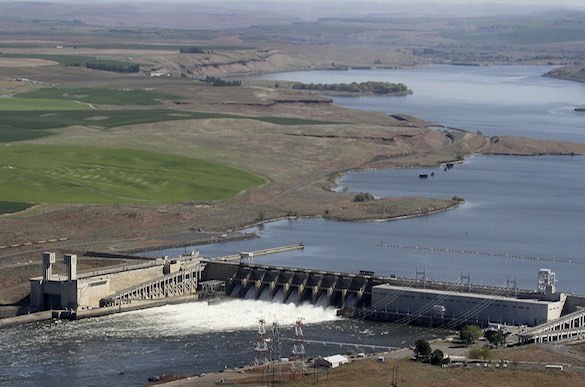forum
library
tutorial
contact

Call for Unity to Breach Snake River Dams and
Restore Salmon to Preserve Our Heritage
by Rudy Soto
Idaho Statesman, July 27, 2021
|
the film forum library tutorial contact |

|
Call for Unity to Breach Snake River Dams and
by Rudy Soto
|
 The essence of being an Idahoan and, in my case, a member of the Shoshone Bannock Tribes of Idaho, centers around our recognizing the importance of the land we live on, air we breathe, water we drink and food we eat. Among the most precious childhood memories and treasured traditions we hold dear is learning how to fish for salmon along the banks of our pristine Snake River. Yet our children and grandchildren's ability to carry out our fishing legacy is at risk due to the decimated populations and endangered status of steelhead and salmon.
The essence of being an Idahoan and, in my case, a member of the Shoshone Bannock Tribes of Idaho, centers around our recognizing the importance of the land we live on, air we breathe, water we drink and food we eat. Among the most precious childhood memories and treasured traditions we hold dear is learning how to fish for salmon along the banks of our pristine Snake River. Yet our children and grandchildren's ability to carry out our fishing legacy is at risk due to the decimated populations and endangered status of steelhead and salmon.
Science has shown that breaching the four Lower Snake River dams would have the greatest impact on salmon recovery. While the dams allow for some fish passage, the hardship of migrating from the ocean to spawning ground and back through eight dams and reservoirs is more than most fish can endure. Billions have been spent on illegal and inadequate federal salmon plans, to no avail. Meanwhile, the benefits provided by the Lower Snake River dams no longer outweigh the negative impacts: The dams are in disrepair and costly to maintain; most of the power generated by the dams is sold to California; and shipping through the dams is down by 80 percent.
Thankfully, community leaders, organizations, businesses, tribes and elected officials have stepped up to change the course of this trajectory.
A leader among them is U.S. Rep. Mike Simpson, R-Idaho, who this year proposed the Columbia Basin Initiative, a comprehensive proposal that will not only address the imminent salmon extinction crisis but also restore fishing-dependent economies, break the unsustainable cycle of costly and endless court battles and secure an affordable, reliable and clean energy future for generations to come.
My organization, Western Leaders Network, a nonpartisan nonprofit organization composed of 450 local and tribal elected officials across the Interior West, has expanded its conservation work to include salmon restoration and to garner support for Simpson's initiative.
Under Simpson's plan, the four dams on the Lower Snake River would be removed. Meanwhile, $33 billion would be allocated to fund infrastructure, river restoration, and economic development. The package would benefit all of the Northwest by strengthening our agricultural and fishing communities, modernizing our energy grid, and restoring salmon and steelhead populations back to a healthy and wholesome place.
The Columbia Basin Initiative would be an ideal component of the national infrastructure bill currently being debated by Congress, since it aligns with the administration's conservation and clean energy principles and priorities.
Rep. Simpson has built broad support across stakeholder groups. Elected officials across the political spectrum agree that this is an urgent and momentous opportunity to work toward recovering endangered wild salmon and steelhead populations; strengthen the Inland Northwest's energy system, agriculture industry, transportation system and economy; and uphold federal treaty and trust responsibilities to tribes. As confirmed by the Boldt Decision in United States v. Washington, state and federal governments have a duty to protect salmon habitat in order to honor treaty reserved rights of tribal members to fish, hunt and gather. Without fish to harvest, there can be no treaty rights.
In the Columbia Basin Initiative, the Biden administration and the 117th Congress have the opportunity to secure congressional funding for salmon recovery and river restoration throughout the Northwest. Squandering this chance is to risk losing a multibillion-dollar resource that supports tens of thousands of jobs. Meanwhile, litigation costs will continue to pile up, and energy and economic insecurity will persist in the Northwest.
Here in the Interior West, our farming, ranching and tribal communities and our outdoor recreation economies are interdependent, and salmon fishing is a central part of our culture as well as our quality of life. A significant federal infrastructure investment in alternative energy and transportation would provide a unique opportunity to restore salmon populations, keep local economies whole and preserve the West's many cultures into perpetuity.
learn more on topics covered in the film
see the video
read the script
learn the songs
discussion forum
